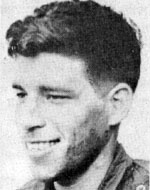Ben Batya and Uri Haim. He was born on the 2nd of Shvat 5731 in the Kvutzat Yavneh, the second son of a family of four, who bore the name of his uncle, his father’s brother, who served as a squad commander in the paratroopers and fell in pursuit of terrorists in the Jordan Valley, Killed in the War of Independence when Egyptian planes bombed the Yavneh group, and when Ezra was three years old, the family moved to Moshav Taquma, where he studied at the elementary school in Kibbutz Sa’ad, in the junior high school at the Beit Yehuda Yeshiva in Kfar Maimon and in the Himmelfarb High School in Jerusalem. Ezra was active in the Bnei Akiva youth movement, as an apprentice and youth counselor. Ezra went on to enrich his Torah education and prepare himself for the IDF in the “Eli” yeshiva preparatory course in Samaria. The rabbi, who headed the yeshiva, shed light on Ezra’s character and personality: “Ezra was one of the students who created the feeling that you did not know who to stand in. Every time I spoke to him I felt that I had to measure myself if I did meet the same criteria , That the demand for justice, that the gentleness, the pleasantness of which he radiated, even if he did not say a word … When you are with him, must be on another level. According to his friends and acquaintances, Ezra knew in his youth that he would be a paratrooper officer, like his father and many of his family. In August 1990, Ezra enlisted in the IDF, volunteering for the Paratroopers Unit, and was assigned to serve in the 101st Battalion. After completing basic training, he continued his advanced training course and was sent to expand his combat training in a Infantry Corps course, And joined the 101st command. In February 1992, Ezra was sent to the Infantry Officers Course, where he received the rank of officer and was sent to serve as a platoon commander in the Commanders’ School. In his last position he served briefly. Ezra was unwilling to accept his position as a guide, and did everything possible to return to his unit, to his combat role. In his opinion on the officers, he wrote: “A very good officer, a professional … … thinking in an original manner, doing his job in a good and full way, taking care of his good deeds … He loves his subordinates … He is a serious interlocutor. According to an especially high scale of values. ” In one of his letters from Lebanon, Ezra wrote to his friend, Danny: “I am embarking on a dangerous activity, in which there is a great deal of chance that I will meet terrorists … There is always a desire to contact the terrorists, but anyway, the first thing I want is for everyone to return safely without any scratch from the activity.” . In his last letter, Ezra wrote to Danny: “… The activity I am doing here has a very heavy responsibility … I take after me the most difficult tasks for soldiers, and what I will decide and how I will determine their fate is the essence of a commander and an officer in a combat unit like our…”. On April 24, 1993, Ezra was killed and was hit by the fire of our forces in an operational accident during an ambush in the region of Kabriha in southern Lebanon, where three of his comrades fell: Staff Sergeant Dvir Yaakov Mor Haim, Sergeant Ehud Halamish and Sergeant Yaakov Gabbai. Ezra was brought to eternal rest in the military section of the cemetery in Kvutzat Yavneh in the grave of his uncle and grandmother and other family members who perished in the wars of Israel. Survived by his parents, sister Hadas and two brothers – Guy and her father. He was twenty-two years old when he fell. After his fall Ezra was promoted to lieutenant. In a letter of condolence to the bereaved family, the unit commander wrote: “Ezra joined the unit during operational employment in Zerit, on the Lebanese border, and took over command of the Spear Division, and he taught his soldiers and began to instill in them the roots of a stable and robust platoon.A platoon for a trained unit that, indeed, demonstrated its ability in operational employment on the Ramim Ridge. … Ezra was an example when he was responsible for the battle procedure. Thorough, punctual and professional, for every activity, briefing, drilling and research. Ezra participated in the funeral of his soldiers and made sure that the soldiers of his platoon continued to visit the family home. It is clear to him that immediately after the mourning period he must return to action. “He led his soldiers night and night to missions beyond the borders of the State of Israel.” One of his comrades wrote on the day of his death: “Look for the person who spent his entire life working in the field and raised flowers. Look for the person who navigated and practiced in the field and raised soldiers. / Search for the person who combined, in a pure form, all three / Look for the person in all his ways, always, was a person. “
